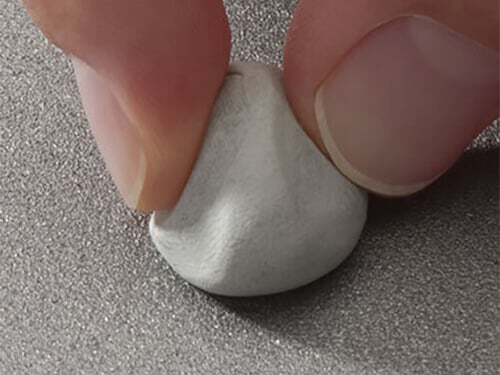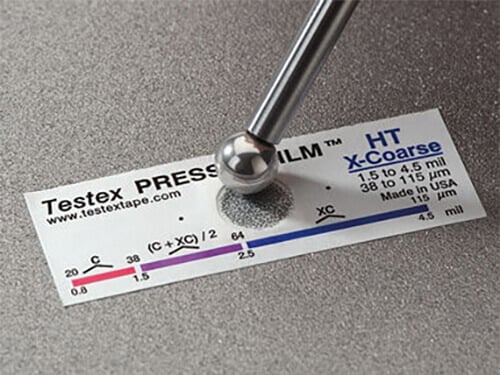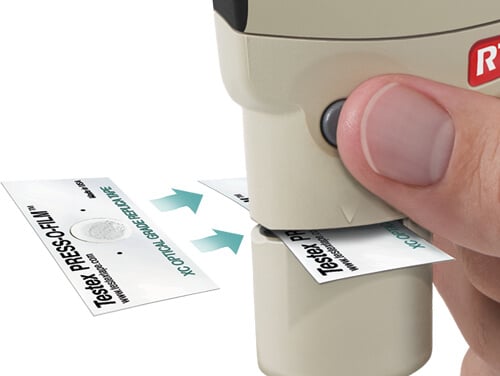![]()
DeFelsko PosiTector RTR H Surface Profile Gage: Models Available![]()
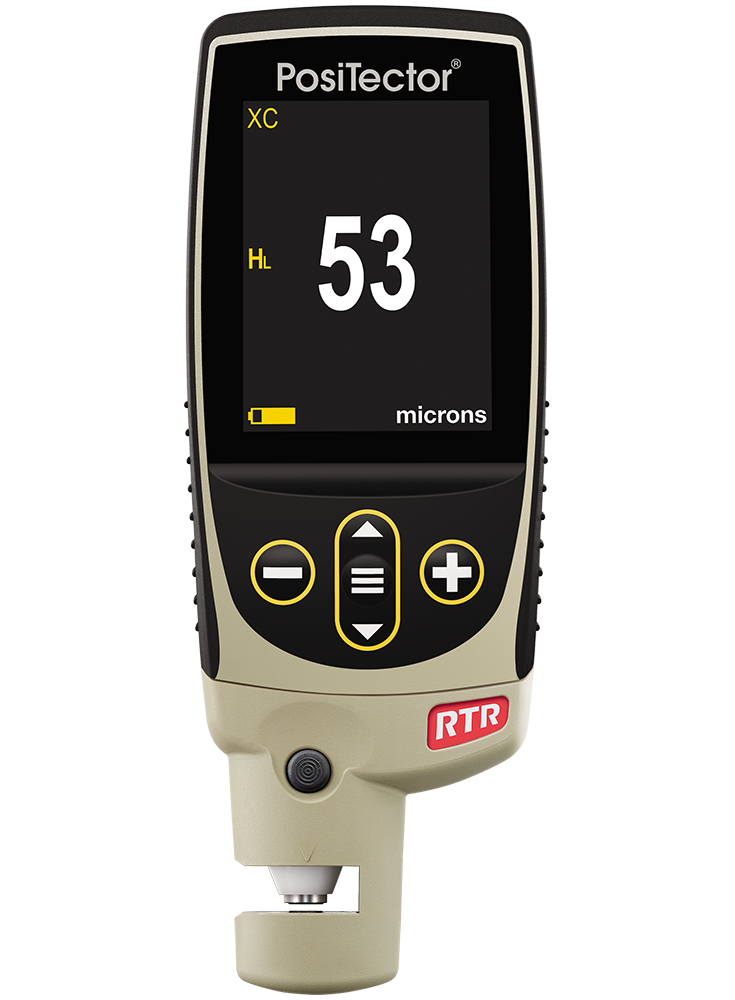 |
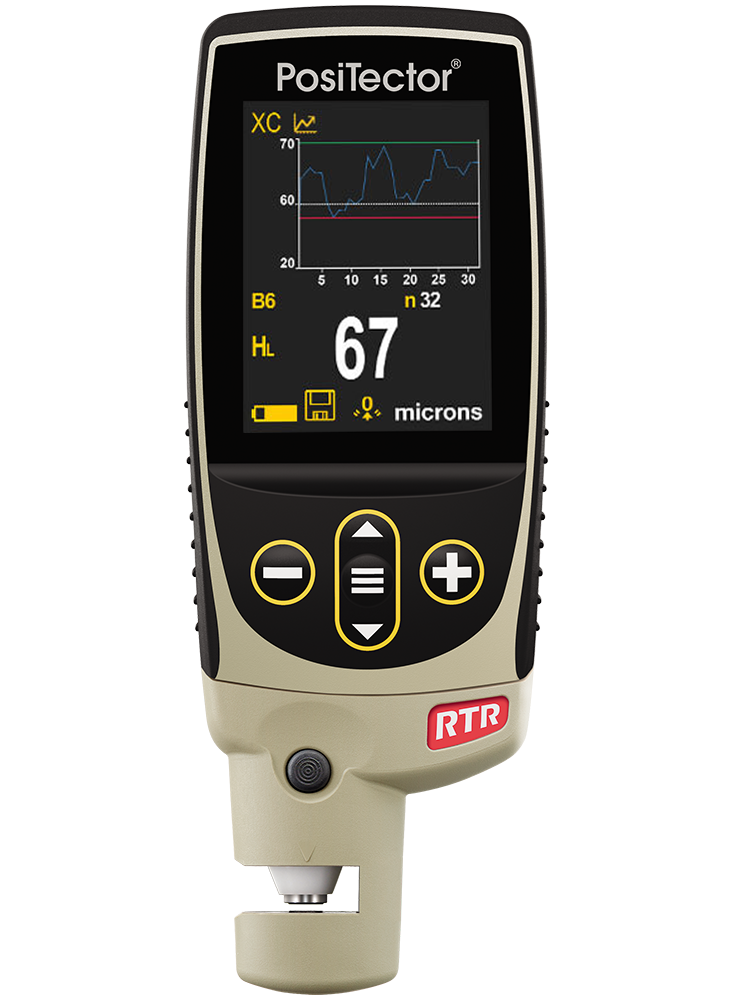 |
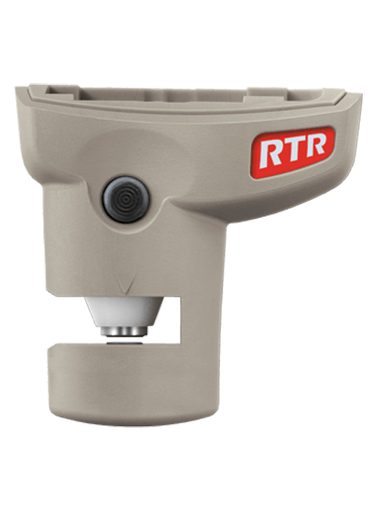 |
|
Product |
DeFelsko RTRH1-G PosiTector RTR H1 Standard Replica Tape Reader / Surface Profile Gage | DeFelsko RTRH3-G PosiTector RTR H3 Advanced Replica Tape Reader / Surface Profile Gage | DeFelsko PRBRTRH PosiTector RTR Replica Tape Reader Probe Only |
| Order Code | RTRH1-G | RTRH3-G | PRBRTRH |
| Peak Height (Hl) Measurement Range | 20 to 115 μm (0.8 to 4.5 mils) | 20 to 115 μm (0.8 to 4.5 mils) | 20 to 115 μm (0.8 to 4.5 mils) |
| Peak Height (Hl) Accuracy | ± 5 μm (± 0.2 mils) | ± 5 μm (± 0.2 mils) | ± 5 μm (± 0.2 mils) |
| Peak Height (Hl) Resolution | 1 μm (0.1 mils) | 1 μm (0.1 mils) | 1 μm (0.1 mils) |
| Anvil Diameter | Ø6.3 mm (Ø0.25 inch) | Ø6.3 mm (Ø0.25 inch) | Ø6.3 mm (Ø0.25 inch) |
| Anvil Pressure | 1.1 Newtons (110 gram-force) | 1.1 Newtons (110 gram-force) | 1.1 Newtons (110 gram-force) |
![]()
DeFelsko PosiTector RTR H Surface Profile Gage: Features![]()
Simple
- Measures peak height (HL)
- Automatically subtracts the 50.8 μm (2 mils) incompressible film from all readings
- Minimizes inspector workload by reducing the number of replicas needed to ensure accuracy
- NEW Larger 2.8" impact resistant color touchscreen with redesigned keypad for quick menu navigation
- NEW On-gage help explains menu items at the touch of a button
- RESET feature instantly restores factory settings
- Durable
- NEW Weatherproof, dustproof, and water-resistant—IP65-rated enclosure
- Rugged indoor/outdoor instrument—ideal for field or shop use
- NEW Ergonomic design with durable rubberized grip
- Shock-absorbing, protective rubber holster for added impact resistance
- Two year warranty on gage body AND probe
Accurate
- Produces a more accurate peak-to-valley height measurement. See linearized peak height (HL)
- Certificate of Calibration showing traceability to PTB included (Long Form)
- Conforms to national and international standards including ISO 8503-5, ASTM D4417 Method C, NACE RP0287 and SSPC-PA17
Versatile
- PosiTector body accepts all PosiTector RTR, SPG, 6000, 200, DPM, IRT, SST, SHD, BHI, and UTG probes easily converting from a surface profile gage to a coating thickness gage, dew point meter, soluble salt tester, hardness tester, or ultrasonic wall thickness gage
- Mils/Microns switchable
- Selectable display languages
- NEW Auto rotating display with Flip Lock
Powerful
- Statistics mode continually displays/updates average, standard deviation, min/max, and number of readings while measuring
- NEW Screen Capture—save 100 screen images for record keeping and review
- NEW Instant-on feature quickly powers up the gage if recently powered down
- NEW Up to 30% longer battery life
- USB port for fast, simple connection to a PC and to supply continuous power. USB cable included
- PosiSoft USB Drive—stored readings and graphs can be accessed using universal PC/Mac web browsers or file explorers. No software required.
- Every stored measurement is date and time stamped
- Software Solutions for viewing, analyzing & reporting data
- Software Updates via web keep your gage current
![]()
DeFelsko PosiTector RTR H Surface Profile Gage: Standard Model Feature![]()
Includes ALL features as shown above plus:
- NEW Storage of 1,000 readings per probe—stored readings can be viewed or downloaded
![]()
DeFelsko PosiTector RTR H Surface Profile Gage: Advanced Model Features![]()
Includes ALL features as shown above plus:
- NEW Storage of 250,000 readings from multiple probes in up to 1,000 batches
- Live graphing of measurement data
- NEW Touchscreen keyboard for quickly renaming batches, adding notes, and more
- WiFi technology wirelessly synchronizes with PosiSoft.net and downloads software updates
- Bluetooth 4.0 Technology for data transfer to a mobile device running the PosiTector App or optional portable printer. BLE API available for integration into third-party software.
- Integrate with third-party software, drones, ROVs, PLCs, and robotic devices using several industry-standard communication protocols
![]()
DeFelsko PosiTector RTR H Surface Profile Gage: Specifications![]()
| Peak Height (HL) Measurement Range | 20 to 115 μm (0.8 to 4.5 mils) |
| Peak Height (HL) Accuracy | ± 5 μm (± 0.2 mils) |
| Peak Height (HL) Resolution | 1 μm (0.1 mil) |
| Anvil Diameter | Ø6.35 mm (Ø0.25 inch) |
| Anvil Pressure | 110 gram-force (1.1 Newtons) |
| Size | 152 x 61 x 28 mm | (6" x 2.4" x 1.1") |
| Weight | 140 g (4.9 oz.) without batteries |
![]() How It Works
How It Works![]()
![]() DeFelsko PosiTector RTR H Surface Profile Gage: Videos
DeFelsko PosiTector RTR H Surface Profile Gage: Videos![]()
 |
 |
 |
 |
![]()
PosiSoft Suite of Software![]()
Four FREE and unique ways to view and report your PosiTector and PosiTest data. Learn More
|
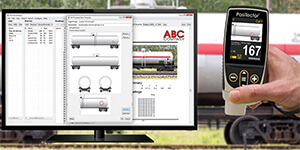 |
![]() DeFelsko Accessories
DeFelsko Accessories![]()
Accessories for DeFelsko Inspection Instruments - Online Catalog
![]()
Downloads![]()
| DeFelsko PosiTector RTR H Surface Profile Gage for Blasted Steel and Textured Coatings - Literature |
| DeFelsko PosiTector RTR H Surface Profile Gage for Blasted Steel and Textured Coatings - Instruction Manual |
| DeFelsko PosiTector RTR H Surface Profile Gage for Blasted Steel and Textured Coatings - Linearization of Roughness Measurements |
 |
DeFelsko Accessories for Inspection Instruments - Online Catalog |




